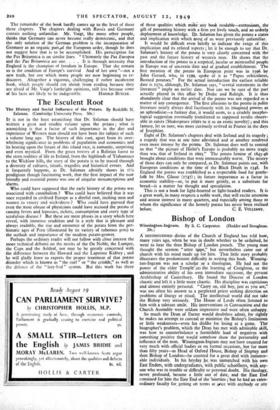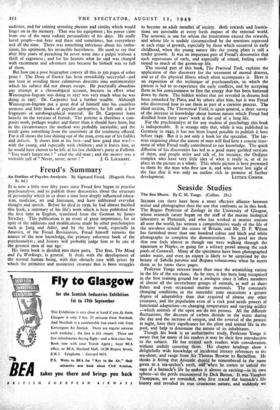Bishop of London
A' DISTINGUISHED divine of the Church of England has told how, many years ago, when he was in doubt whether to be ordained, he went to hear the then Bishop of London preach. The young man thought the sermon "utter troipe," but nevertheless came out of church with his mind made up for him. That little story probably illustrates the predominant difficulty in writing this book. Winning- ton-Ingram was not a scholar or a theologian. He had not the power of the elder Temple.or the learning of Creighton, or the administrative ability of his own immediate successor, the present Archbishop of Canterbury. He found the Diocese of London chaotic and left it a little more chaotic. His discipline was capricious and almost entirely personal. "Carry on, old boy, just as you are," was too often his answer to a perplexed priest seeking direction on problems of liturgy or ritual. The intellectual world did not take the Bishop very seriously. The House of Lords often listened to him with a tolerant smile. His interventions in Convocation and the Church Assembly were seldom impressive and were often unhappy.
So much the Dean of Exeter would doubtless admit, for rightly he makes no attempt to conceal or minimise the Bishop's limitations or little weaknesses—even his dislike for losing at a game. The biographer's problem, which the Dean has met with admirable skill, was how to counterbalance a formidable load of negatives with something positive that would somehow show the personality and influence of the man. Winnington-Ingram may not have counted for very much with official bodies or on formal occasions, but for more than fifty years—as Head of Oxford House, Bishop of Stepney and then Bishop of London—he counted for a great deal with innumer- able individuals. In his heyday /le , was unmatched with his own East Enders, with undergraduates, with public schoolboys, with any- one who was in trouble or difficulty or personal doubt. His theology, never profound, became a little out of date, and the Bat End remained for him the East End of the 'nineties ; but he had an extra- ordinary faculty for getting on terms at once with anybody or any
audience, and for coining arresting phrases and similes which would linger on in the memory. That was his equipment ; his power came from one of the most radiant personalities of his days. He really loved people—not here and there and sometimes, but everywhere and all the time. There was something infectious about his enthu- siasm, his optimism, his invincible boyishness. He used to say that after fifty years of preaching he never went into a pulpit without a thrill of eagerness ; and for his hearers what he said was charged with excitement and adventure just because he himself was so full of them.
But how can a poor biographer convey all this in 350 pages of sober print ? The Dean of Exeter has been remarkably successful—and not least in avoiding those calamitous descents into sentimentality which his subject did not always escape. He practically abandons any attempt at a chronological account, because in effect what Winnington-Ingrant was doing in 1937 was very much what he was doing in 1907. Dr. Carpenter had a further trouble. Although Winnington-Ingram put a great deal of himself into his countless sermons and little books of popular apologetics, he left only a few fragments of autobiographical material. So Dr. Carpenter leans heavily on the versions of friends. The portrait is therefore a com- posite work, perhaps weaker and flatter than it should have been, but in the circumstances the method was probably inevitable, and the result gains something from the unanimity of the testimony offered. For it all shows the love shining out of the man, even out of his foibles and defects. It shows him at his best—and how good that was!— with the young, and especially with children ; and it leaves him, as he would have chosen to be left, at his last children's party at Fulham. "You won't forget me ? " cried the old man ; and the answer was a veritable yell of "Never, never, never ! " J. G. LOCKHART.































 Previous page
Previous page